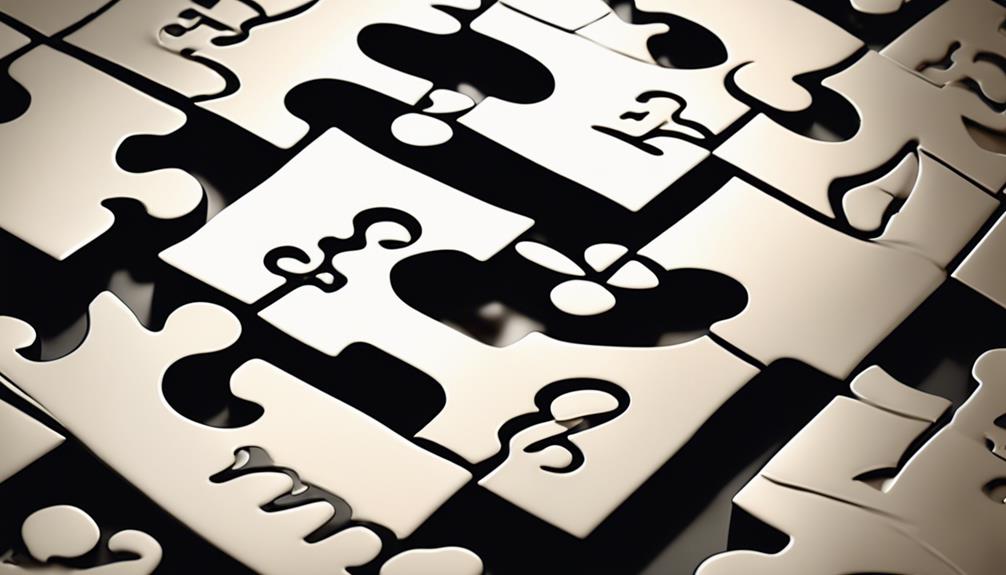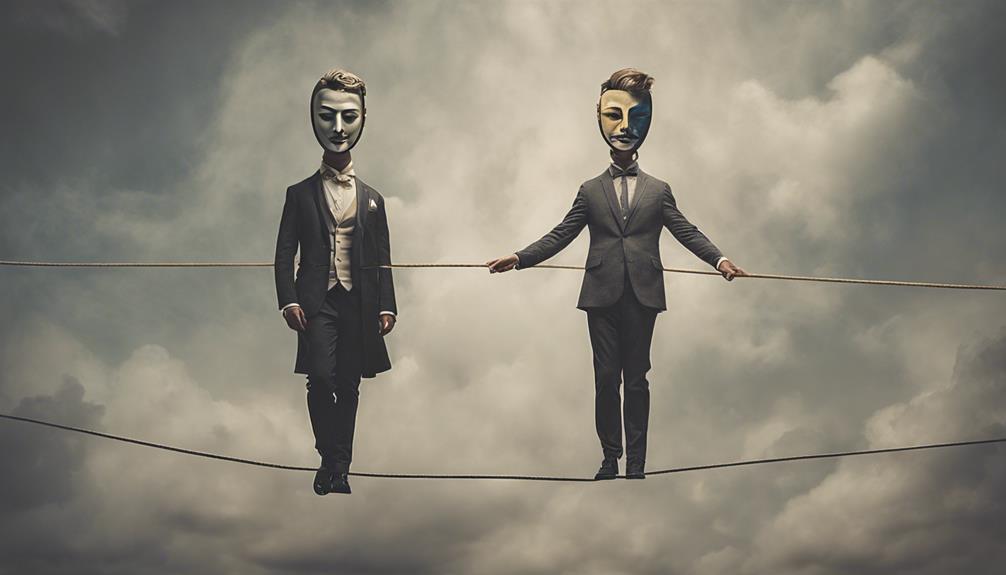As we delve into the complex motivations behind getting blocked, we discover a network of feelings and complexities that typically stay concealed.
Have you ever wondered why the abrupt act of being blocked can leave us feeling bewildered and questioning what went wrong?
The enigma of being blocked by someone we thought we knew well can reveal deeper insights into human behavior and relationships.
Join us on this journey of discovery as we peel back the layers of this digital age phenomenon and shed light on the mysteries that lie beneath the surface.
Key Takeaways
- Blocking is often driven by emotional reactions and a desire for control.
- Jealousy, communication challenges, and emotional confusion can lead to blocking.
- Blocking may signify moving on, unresolved conflicts, or power dynamics.
- It can be a form of self-protection, attention-seeking, or establishing boundaries.
Emotional Reactions Behind Blocking
When someone blocks you, their emotional reactions often play a significant role in their decision-making process. It's common for impulsive retaliation to surface when feelings are hurt, leading to actions like blocking.
Feeling the need to restore control in a situation can drive this behavior, even though it may not always seem like the best choice. Blocking serves as a clear message of being affected by someone's actions, sometimes indicating a level of vulnerability.
Understanding that restoring a sense of power through blocking may stem from a place of emotional turmoil can help navigate the complexities of such actions. Remember, it's okay to feel hurt or confused in these situations, and it's important to approach them with empathy and understanding.
Relationship Dynamics and Blocking

Understanding the dynamics of relationships plays a crucial role in deciphering the reasons behind blocking behavior. When it comes to the intricate dance of love and connection, factors like jealousy dynamics and relationship boundaries can significantly impact the decision to block someone. Here are a few key points to consider:
- Jealousy in relationships can trigger the urge to block.
- Setting and respecting relationship boundaries is essential for healthy interactions.
- Feeling threatened by interactions with others can lead to blocking.
- Establishing clear communication about what's acceptable behavior can prevent misunderstandings and unnecessary blocking incidents.
Communication Challenges Leading to Blocking
Navigating communication challenges can often lead to instances of blocking as individuals seek to manage their emotional reactions and maintain a sense of control. Communication breakdowns and misunderstandings may trigger feelings of being overwhelmed or annoyed, prompting someone to block to avoid awkward confrontations. Evaluating behaviors like excessive tagging or messaging could also contribute to the decision to block, especially if digital boundaries or social etiquette are perceived to have been breached. People have varying thresholds for tolerance, and blocking might be a way to sidestep difficult conversations. Here's a table outlining some common challenges that can lead to blocking:
| Communication Challenges | Examples of Triggers |
|---|---|
| Misunderstandings | Excessive tagging or messaging |
| Digital boundaries | Feeling overwhelmed or annoyed |
| Social etiquette | Avoiding awkward confrontations |
Emotional Confusion and Blocking

Feeling emotionally confused can sometimes lead to the decision to block someone as a way to manage conflicting feelings and thoughts. Here are some insights into this complex emotional state:
- Desire for closure: Blocking may stem from a need to create distance for personal clarity.
- Coping mechanisms: Blocking can serve as a temporary coping strategy to deal with overwhelming emotions.
- Seeking understanding: The act of blocking might be a way to understand personal feelings better.
- Internal struggle: Blocking can be a manifestation of an internal battle between conflicting emotions and desires.
Moving On Signaled by Blocking
As individuals navigate through emotional confusion and coping mechanisms like blocking, a clear indication of moving on can often be signaled through this action. Blocking serves as part of the closure process, helping in emotional detachment from the past relationship. It's a passive yet powerful way of showing that one is no longer invested emotionally, signaling the completion of a chapter. Below is a table illustrating how blocking can be a significant step towards moving on:
| Closure Process | Emotional Detachment | Moving On Signaled |
|---|---|---|
| Facilitates letting go of past emotions | Creates emotional distance | Indication of emotional readiness for new beginnings |
| Helps in ending lingering attachments | Reduces emotional ties to the past | Symbolizes closure and readiness to move forward |
| Closure from past relationship dynamics | Signals disconnection from past feelings | Represents a shift in emotional focus |
Conflict Resolution and Blocking

Understanding the role of conflict resolution in the context of blocking can shed light on the complexities of communication dynamics in relationships.
- Conflict resolution strategies: Implementing healthy ways to address disagreements can prevent the need for blocking.
- Emotional maturity: Developing the emotional intelligence to navigate conflicts can foster better communication and understanding.
- Relationship boundaries: Setting clear boundaries can help prevent misunderstandings that lead to blocking.
- Communication styles: Recognizing and adapting to different communication styles can facilitate effective conflict resolution.
Power Dynamics in Blocking Behavior

Navigating the dynamics of blocking behavior involves acknowledging the power plays at play within relationships. It's essential to recognize how dominance display and control tactics can influence blocking decisions. Sometimes, blocking is used as a power move to assert dominance or to get attention. This behavior can signify emotional immaturity if blocking is utilized as a control tactic. Serial blocking could be a red flag indicating deeper issues. Adults should prioritize open discussions over resorting to blocking to show dominance in a relationship. Understanding these power dynamics can help decipher the underlying motivations behind being blocked.
| Power Dynamics | Blocking Behavior | Relationship Impact |
|---|---|---|
| Dominance Display | Asserting power | Shifting dynamics |
| Control Tactics | Manipulating access | Establishing boundaries |
| Emotional Immaturity | Insecure behavior | Negative repercussions |
Internal Conflicts and Blocking

In times of internal conflicts, blocking can serve as a means of regrouping feelings and refocusing priorities. It's essential to acknowledge the emotional turmoil that might lead to cutting off communication and taking a step back. Here are some ways blocking can be intertwined with our inner struggles:
- Self-reflection: Using blocking as a tool for introspection and understanding personal emotions.
- Prioritizing thoughts: Sorting through conflicting thoughts and emotions by creating space through blocking.
- Regrouping feelings: Allowing oneself the time and space to process emotions and gain clarity.
- Cutting off distractions: Removing external influences to focus on internal dilemmas and feelings.
Frequently Asked Questions
How Can External Influences, Such as Friends or Family, Impact a Person's Decision to Block Someone?
External influences, like friends or family, can deeply impact one's decision to block someone. Influence dynamics and trust issues play a crucial role in shaping this choice.
We understand how outside voices can sway emotions and decisions, sometimes clouding judgment. It's essential to recognize the complexities of relationships and how trust can be fragile, easily influenced by those around us.
Navigating these dynamics requires empathy, self-awareness, and open communication.
What Are Some Common Signs That Blocking Is Being Used as a Form of Attention-Seeking Behavior?
When someone uses blocking as a form of attention-seeking behavior, it can be a sign of seeking validation or reassurance from you. This manipulation can create a communication breakdown and have a negative emotional impact on both parties involved.
It's essential to recognize these signs and address them with empathy and understanding. By establishing healthy boundaries and promoting open communication, we can navigate these situations with sensitivity and care.
Can Blocking Be a Way for Someone to Establish Boundaries in a Relationship? if So, How?
Absolutely, blocking can definitely serve as a way for someone to establish boundaries in a relationship. It can be a form of communication breakdown and emotional detachment, allowing for personal space and defining relationship boundaries.
Are There Any Specific Indicators That Blocking Is Being Used as a Self-Protection Mechanism?
When we consider indicators of blocking as a self-protection mechanism, we look at how it serves as a psychological defense and coping mechanism.
Blocking can be a way to shield oneself from potential harm or negative interactions, protecting emotional well-being and prioritizing mental health.
In cases of emotional protection or communication breakdowns, blocking may signify a need for self-preservation and establishing personal boundaries for our own well-being.
How Does Blocking Serve as a Proactive Step in the Healing Process From a Past Relationship?
Blocking can serve as a proactive step in our emotional healing and closure. It allows for self-reflection, aiding in moving forward from past relationships.
By creating distance, we prioritize our well-being and protect ourselves from potential harm. Through establishing boundaries, we define limits and communicate our need for space.
This process of blocking can be a powerful tool in our healing journey, guiding us towards emotional growth and eventual peace.
Conclusion
In the intricate dance of relationships, being blocked can feel like stumbling in the dark. But through empathy and understanding, we can illuminate the shadows and uncover the reasons behind this mysterious act.
Like a key unlocking a door, exploring the emotional reactions, communication challenges, and power dynamics at play can offer insight and clarity. Let's navigate the complexities with compassion, knowing that sometimes, being blocked is a signpost pointing us towards a brighter path ahead.
Emmeline is the backbone of our content creation team, bringing complex psychological concepts to life with clarity and empathy. As our Expert Writer, she crafts engaging, insightful articles that guide readers through the intricacies of personality assessments and what they reveal about the human condition. Her passion for psychology and personal development shines through in every piece she writes.










